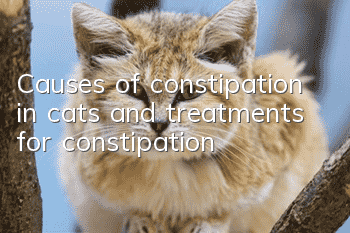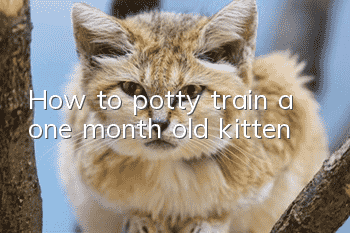Causes of constipation in cats and treatments for constipation

Cat constipation has many causes like human constipation, but we should not be careless when dealing with cat constipation, because if the cat's constipation is not handled properly, it will also cause the onset of other diseases and worsen the condition. Therefore, when facing cat constipation Don’t be careless, especially kittens and elderly cats. Let’s take a look at the main causes of constipation in cats.
1. The causes of this disease are the following three factors:
1. Feeding and management: Factors such as long-term feeding of dry food, lack of drinking water, eating human hair and foreign objects, lack of exercise, and sudden changes in feed, environment, and management may all induce this disease.
2. Diseases: Painful defecation diseases (such as rectal polyps, proctitis, rectal stricture, tumors, anal abscess, etc.), constipation occurs due to the disappearance of the normal urge to defecate.
3. Self: Diseases that impede defecation movements (such as medullary joint dislocation, pelvic fractures and hind limb fractures, etc.) can cause constipation.
2. Symptoms:
In the early stage, the sick cat exerts force to defecate and excretes a small amount of dry stool with mucus or a small amount of foul-smelling loose stool. In the later stages of the disease, sick cats may become restless, try to defecate but cannot do so easily, become nervous, cry, and frequently review their abdomen. Then the appetite decreases or disappears, and the spirit becomes depressed. Some had vomiting, obvious tenesmus, enlarged abdominal circumference, and intestinal bloating.
3. Treatment methods:
1. Enema therapy: suitable for mild and simple constipation. Use 40-80 ml of warm soapy water and pour it into the intestine with an enema device, and use external abdominal pressure to moderately press the fecal mass in the intestine. It usually works.
2. Drug therapy: Take an appropriate amount of laxatives orally. For example, 5-30 grams of magnesium sulfate or 5-50 ml of liquid paraffin oil should be taken orally.
3. Surgical therapy: For severe intestinal constipation, when the above methods cannot be used, surgery can be performed to remove the fecal matter from the intestinal cavity.
Four. Other methods
Feed the sick cat a spoonful of salad oil to lubricate the intestines. 10ml at a time, fed 2-3 times, should help. In addition, you can give him a little milk, but not too much. Usually the bottom of a bowl is enough.
- Will long-term consumption of cat food cause urinary tract stones?
- Types, causes and treatments of cat attacks
- Why does the cat have no energy and keeps sleeping?
- Two major aspects to protect cats from parasites
- What are the symptoms of cats in estrus?
- Vomiting and diarrhea are common side effects in cats after deworming!
- Why are cats tail docked?
- What should I do if my newly bought cat doesn’t eat?
- Why does Garfield keep crying? These may be the reasons!
- Where do cats like to be touched most? Head, neck, and back are the top three



